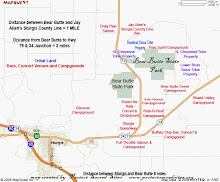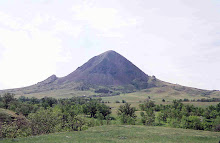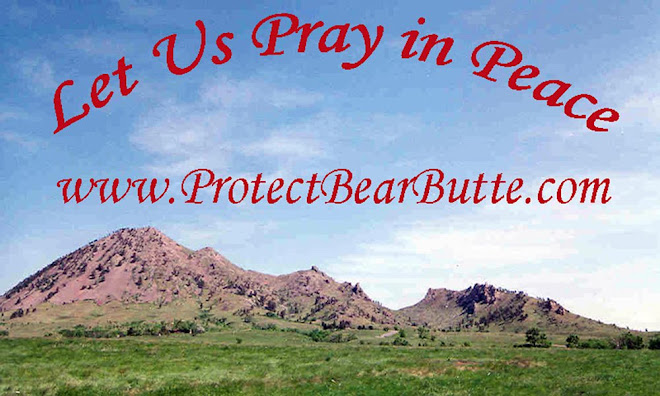South Dakota governor moves to protect Bear Butte
Posted: December 31, 2007
by: The Associated Press
David Melmer Indian Country -- South Dakota Gov. Mike Rounds has proposed using state, federal and private money to buy a perpetual easement that would prevent commercial and residential development of some land on the western side of Bear Butte.
By Chet Brokaw -- Associated Press
PIERRE, S.D. (AP) - For centuries, members of the Lakota, Cheyenne and other American Indian tribes have been climbing Bear Butte to fast and hold religious ceremonies.
Colorful prayer cloths hanging from trees line the path to the top of the mountain, which rises about 1,300 feet above the surrounding plain.
But often, and especially in August, the serenity of the site is disturbed by a deafening roar, caused by thousands of motorcycles.
Indians have sought for years to block development of land around the butte into campgrounds, bars and other sites that could interfere with their religious use of the mountain. Now they have an ally in the governor.
Gov. Mike Rounds wants to spend more than $1 million to prevent developers from putting biker bars and other noisy businesses on ranch land near the mountain on the northern edge of the Black Hills.
Saying he wants to protect the beauty and peace of the religious site, Rounds has proposed using state, federal and private money to buy a perpetual easement that would prevent commercial and residential development of some land on the western side of Bear Butte.
Indians working to protect Bear Butte praise the Republican governor's plan.
''Any kind of assistance from anybody in preserving the butte is welcome,'' said Gene Blue Arm, a Cheyenne River Sioux tribal member who has sought to limit development near the religious site.
''It's good of him,'' Blue Arm said. ''I think it's a good deal.''
Dean Wink, a member of the Meade County Commission, said he opposes a perpetual easement that would block all future owners from considering other uses for the land. But he said he could support an easement that prohibits development for a decade or two.
''Forever is a long time,'' Wink said.
The governor made only a brief mention of the plan in his budget speech to the South Dakota Legislature, which is being asked to approve an emergency special spending measure for Bear Butte. The easement could help calm some worries about the mountain, Rounds said.
Details will not be available until the legislative session opens in January, but it might cost up to $1 million to get the easement, State Parks Director Doug Hofer said.
Rounds' plan would use $250,000 in state money, to be matched with $344,000 in private donations and a $594,000 grant from a federal program that protects agricultural land, to buy a perpetual conservation easement on some ranch land on Bear Butte's west side.
Named Mato Paha, or Bear Mountain, because it resembles a sleeping bear lying on its side, it was formed by volcanic rock that never erupted and was then exposed when surrounding land eroded.
The butte and the land immediately around it are in a state park that was sold to the state of South Dakota in 1962 for $50,000. Because of the growth of the annual Sturgis Motorcycle Rally in August, land values in the area have skyrocketed.
In recent years, Indians have gathered at Bear Butte and nearby Sturgis during the rally to protest motorcycle noise, loud concerts and alcoholic consumption near the mountain.
The 2007 Legislature rejected a measure seeking to ban the issuance of liquor or beer licenses within four miles of the boundaries of the state park after lawmakers said they did not want to interfere with private property rights.
Wink said he expects the Legislature will have a good discussion on the governor's easement plan, but local residents believe the issue should be handled locally.
''They just think the private property rights and local control are more important,'' the county commissioner said.
Some also have questioned whether tax money should be used for such an easement, Wink said.
But Blue Arm said the sacred mountain must be protected.
''I'm saying yes to anything to stop further development around the butte,'' Blue Arm said. ''In a ceremony or in prayer, there needs to be a solitude.''
http://www.indiancountry.com/content.cfm?id=1096416379
Monday, December 31, 2007
Subscribe to:
Posts (Atom)



